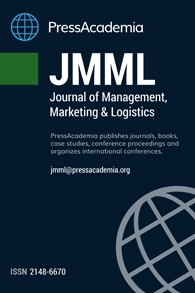IS FEAR OF FAILURE A PSYCHOLOGICAL BARRIER? AN EMPIRICAL STUDY ON OCCUPATIONAL CHOICES
IS FEAR OF FAILURE A PSYCHOLOGICAL BARRIER? AN EMPIRICAL STUDY ON OCCUPATIONAL CHOICES
Fear, failure fear of failure, occupational choice, entrepreneurial intention,
___
- Arenius, P., & Minniti, M. 2005, “ Perceptual variables and nascent entrepreneurship”, Small business economics, vol. 24, no. 3, pp. 233247.
- Baum, J. R. and Locke, E. A. 2004, “The relationship of entrepreneurial traits, skill, motivation to subsequent venture growth”. Journal of applied psychology, vol. 89, no.4, pp. 587.
- Cacciotti, G., & Hayton, J. C. 2015, “Fear and entrepreneurship: A review and research agenda”, International Journal of Management Reviews, vol. 17, no. 2 , pp. 165-190.
- Cacciotti, G., Hayton, J. C., Mitchell, J. R., & Giazitzoglu, A. 2016, “A reconceptualization of fear of failure in entrepreneurship”, Journal of Business Venturing, vol. 31, no. 3, pp. 302-325.
- Carsrud, A., & M. Brannback 2011, “Entrepreneurial Motivations: What Do We Still Need to Know?,” Journal of Small Business Management, vol. 49, no. 1, pp. 9–26.
- Conroy, D. E., & Elliot, A. J. 2004, “Fear of failure and achievement goals in sport: Addressing the issue of the chicken and the egg”, Anxiety, Stress & Coping, vol. 17, no. 3, pp. 271-285.
- Conroy, D. E., Metzler, J. N., & Hofer, S. M. 2003, “Factorial invariance and latent mean stability of performance failure appraisals”, Structural Equation Modeling, vol. 10, no. 3, pp. 401-422.
- Conroy, D. E., Willow, J. P., & Metzler, J. N. 2002, “Multidimensional fear of failure measurement: The performance failure appraisal inventory”, Journal of applied sport psychology, vol. 14, no. 2, pp.76-90.
- David E. Conroy. 2001, “Progress in the development of a multidimensional measure of fear of failure: The performance failure appraisal inventory (pfai)”, Anxiety, Stress, & Coping, vol. 14, no.4, pp. 431-452.
- Langowitz, N., & Minniti, M. 2007, “The entrepreneurial propensity of women. Entrepreneurship theory and practice”, vol.31, no.3, pp. 341-364.
- Lazarus, R. S., & Smith, C. A. 1988, “Knowledge and appraisal in the cognition—emotion relationship”, Cognition & Emotion, vol.2, no.4, pp. 281-300.
- Li, Y. 2011, “Emotions and new venture judgment in China”, Asia Pacific Journal of Management, vol. 28, no.2, pp. 277-298.
- Markman, G. D., D. B. Balkin, & R. A. Baron 2002, “Inventors and New Venture Formation: The Effects of General Self-Efficacy and Regretful Thinking”, Entrepreneurship Theory and Practice, vol. 27, no. 2, pp. 149.
- Martin, A. J., & Marsh, H. W. 2003,” Fear of failure: Friend or foe?”, Australian Psychologist, vol. 38, no. 1, pp. 31-38.
- Minniti, M., & Nardone, C. 2007, “Being in someone else’s shoes: the role of gender in nascent entrepreneurship”, Small Business Economics, vol. 28, no. 2, pp. 223-238.
- Mitchell, J. R., & Shepherd, D. A. 2011, “Afraid of opportunity: the effects of fear of failure on entrepreneurial action”, Frontiers of Entrepreneurship Research, vol. 31, no. 6, pp. 1.
- Mitchell, R. K., Busenitz, L. W., Bird, B., Marie Gaglio, C., McMullen, J. S., Morse, E. A., & Smith, J. B. 2007, “The central question in entrepreneurial cognition research”, Entrepreneurship Theory and Practice, vol. 31, no. 1, pp. 1-27.
- Morales-Gualdrón, S. T., & Roig, S. 2005, “The new venture decision: An analysis based on the GEM project database”, The International Entrepreneurship and Management Journal, vol. 1, no. 4, pp. 479-499.
- Patzelt, H., & Shepherd, D. A. 2011. “Negative emotions of an entrepreneurial career: Self-employment and regulatory coping behaviors”, Journal of business venturing, vol. 26, no. 2, pp. 226-238.
- Shane, S. 2009, “Why Encouraging More People to Become Entrepreneurs Is Bad Public Policy”, Small Business Economics, vol. 33, no. 2, 141–149.
- Sieger, P., & Monsen, E. 2015, “Founder, Academic, or Employee? A Nuanced Study of Career Choice Intentions”, Journal of Small Business Management, vol. 53, no. S1, pp. 30-57.
- Shane, S., Nicolaou, N., Cherkas, L. & Spector, T. D. 2010. “Do openness to experience and recognizing opportunities have the same genetic source?”. Human Resource Management, 49(2): 291-303.
- Smith, C. A., & Ellsworth, P. C. 1985, “Patterns of cognitive appraisal in emotion. Journal of personality and social psychology”, vol. 48, no.4, pp. 813.
- Stuart,E.M. 2013, “ The relation of fear of failure, procrastination and self-efficacy To academic success in college for first and non- firstgeneration Students in a private non-selective institution”, Unpublished Doctoral Dissertation, University of Alabama.
- Wagner, J. 2007, “What a difference a Y makes-female and male nascent entrepreneurs in Germany”, Small Business Economics, vol. 28, no. 1, pp. 1-21.
- Welpe, I. M., Spörrle, M., Grichnik, D., Michl, T., & Audretsch, D. B. 2012, “ Emotions and opportunities: The interplay of opportunity evaluation, fear, joy, and anger as antecedent of entrepreneurial exploitation”, Entrepreneurship Theory and Practice, vol. 36, no. 1, pp. 69-96.
- Wennekers, S., A. van Stel, R. Thurik, & P. Reynolds 2005, “Nascent Entrepreneurship and the Level of Economic Development”, Small Business Economics, vol. 24, no.3, pp. 293–309.
- Yayın Aralığı: Yılda 4 Sayı
- Başlangıç: 2014
- Yayıncı: PressAcademia
Ozlem Catli, Aysegul Ermec Sertoglu, Husniye Ors
IS “WORKPLACE FUN” A NEW MANAGEMENT FASHION OR ANOTHER PASSING FAD?
Polat Yucekaya, Omer Faruk Rencber, Meltem Canoglu
ADVERTING MESSAGE AND NEGATIVE SWITCHING BARRIER: EFFECTS ON REPURCHASE INTENTION AND WORD-OF-MOUTH
Chang CHİA-HUA, Nguyen Xuan THO
PEER COMMUNICATION IN SOCIAL MEDIA AND EFFECT ON PURCHASE INTENTION
Hande Begum Bumin Doyduk, Elif Okan
UNDERSTANDING NOSTALGIC CONSUMERS IN A RETAIL ENVIRONMENT: A REVIEW
A RESEARCH ON ANCILLARY PRODUCT BUYING INTENTIONS OF DOMESTIC AIRLINE PASSENGERS IN TURKEY
Ferhan Kuyucak Sengur, Temel Caner Ustaomer, Mustafa Uzgor
Furkan Marasli, Mujdelen Ipek Yener
TARGET MARKET SELECTION IN FRESH FRUIT-VEGETABLE SECTOR USING FUZZY VIKOR METHOD
